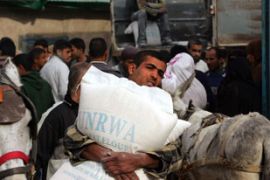‘Gazans can walk’
But Olmert also said that he had no intentions of letting Gazans “live comfortable and pleasant lives” until rocket attacks from the territory ceased.
“As far as I’m concerned, all the residents of Gaza can walk and have no fuel for their cars, because they have a murderous terrorist regime that doesn’t allow people in the south of Israel to live in peace,” he said.
Meanwhile in New York, the UN Security Council agreed to hold an emergency meeting on Tuesday to discuss the situation in the Gaza Strip, diplomats said on Monday.
The decision was in response to a request from Arab envoys to the United Nations and the 57-member Organisation of the Islamic Conference, they added.
Ryad Mansour, the Palestinian observer at the UN, said he wanted a resolution or a statement demanding that Israel lift “its crippling, cruel siege on the Palestinian civilian population” of Gaza which he said amounted to “collective punishment” for rocket firing into the Jewish state.
Israel said its decision to allow the European Union to resume deliveries of industrial fuel as well as diesel for generators and gas used for cooking was only for Tuesday and restrictions would remain in place on petrol for vehicles.
Arye Mekel, an Israeli foreign ministry spokesman, said: “We think Hamas got the message.
“As we have seen in the past couple of days, when they want to stop the rockets, they can,” he said.
Five rockets were fired from Gaza on Sunday, according to the Israeli army, down from 53 in the two previous days.
Gaza City was plunged into darkness on Sunday after its sole power plant was switched off as fuel supplies dried up following the Israeli blockade.
The Israeli move to ease the restrictions came after the UN agency which supports the Palestinians warned it might be forced to stop distributing food aid to 860,000 people in Gaza because of a shortage of plastic bags to pack the food in and fuel for vehicles and generators.
Christopher Gunness, a spokesman for the United Nations Relief and Works Agency (UNRWA), said that the on-off blockade made it very difficult for his agency to provide relief.
“I suppose we have to be grateful for whatever they allow in, because at least it allows us to partially fulfil our mandates,” he told Al Jazeera.
“This hand on the tap, allowing drips in now and drips in later, that’s not what we need. What we need is a sustained opening of the crossings.”
Grave situation
Margaret Chan, director-general of the World Health Organisation, described the situation as grave.
|
|
Israel normally supplies 60 per cent of the electricity for Gaza’s 1.5 million inhabitants
Gaza needs around 240 megawatt of electricity, but normally receives only about 200 megawatts, with 8 per cent from Egypt
Israel is the only source of industrial fuel for Gaza’s power station
Israel stopped supplying industrial fuel supplies to Gaza on January 19
The EU pays Israel around $10m per month for Gaza’s industrial fuel
Around 800,000 people in Gaza City and its surrounding areas are now in darkness
|
“Disruptions in the continuity of essential services take a heavy toll on people needing emergency care and those suffering from conditions such as cancer, heart disease, and diabetes,” she said.
EU officials said hospitals had already been badly hit in the absence of electricity.
Khaled Radi, a spokesman for the ministry of health in Gaza, said that many of them were only performing emergency surgery.
Al Jazeera’s Jacky Rowland, reporting from the east of the Gaza Strip, said raw sewage was spilling out on to the streets, homes and fields because sewage treatment plants were no longer operating as there was no electricity.

